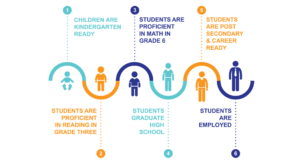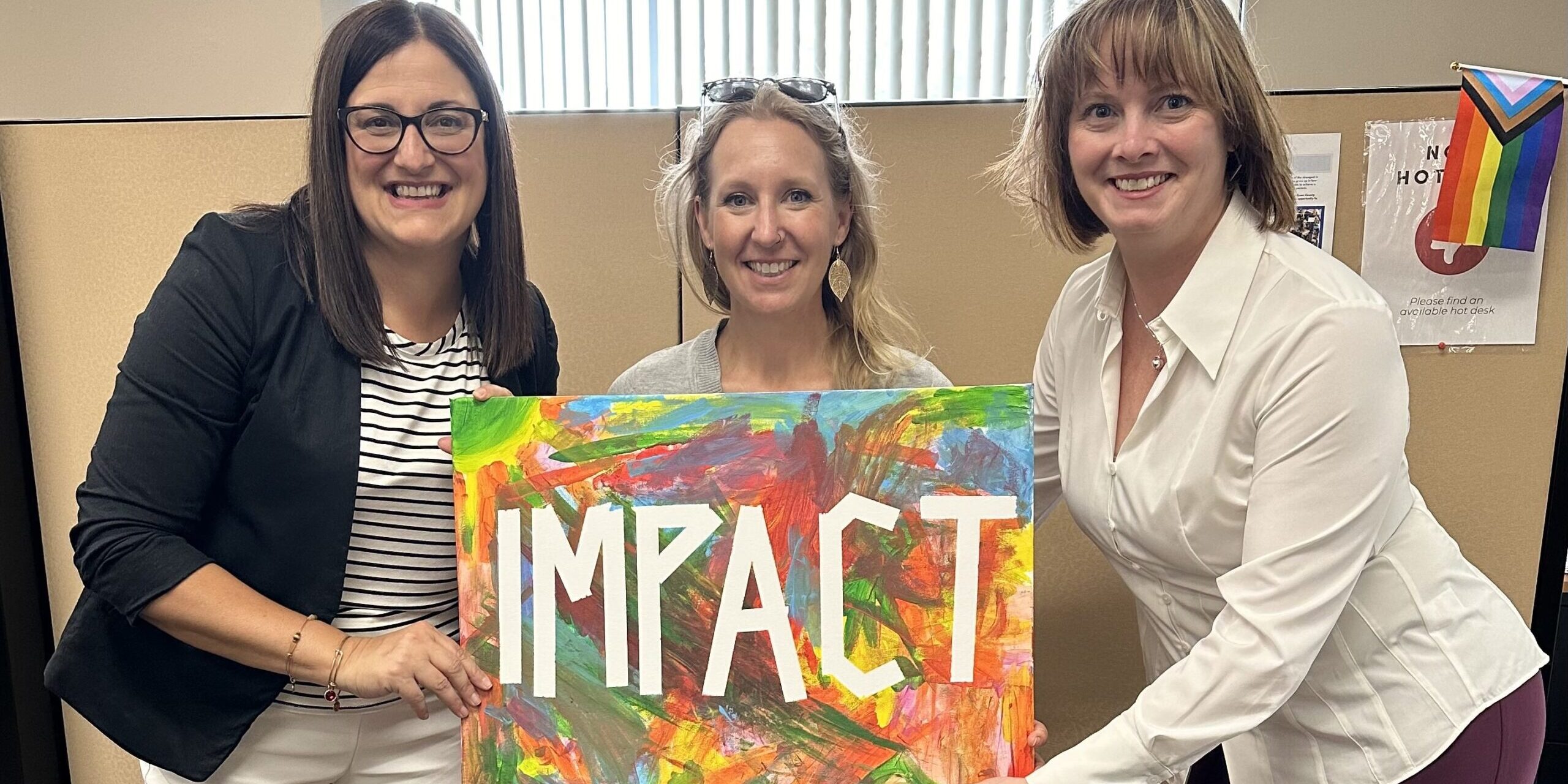“These iPads became more than just gadgets; they became lifelines.”
– Joanne Soave, CEO, Connecting Windsor Essex
When is a gadget not a gadget?
When it’s 2020, and there’s a mission too important for a pandemic to stop.
As an organization, CWE’s focus has always been on doing the work, making the connections that benefit the communities we serve. We often spend our energy doing the work, but not telling the story. In that way, we’re a reflection a region of people who know how to roll up their sleeves and get things done. But this is the story of a network of partnerships, a pledge for the future and the families that are seeing the difference, and it is worth telling.
A Question and A Catalyst
It begins with a question, “How might we ensure that the most vulnerable, and promising members of our population – our children and youth – succeed in their education, career and life?” This question is intimidating. It is, most definitely, a BHAG (a big, hairy, audacious goal).
In 2018, 40+ influential systems -level leaders formed a cross-sector, outcome-focused partnership known as ProsperUs to tackle this very question, how do we ensure a Cradle to Career pathway for child and youth opportunity in our region. ProsperUs’ mission would be to facilitate the community creation of a Cradle to Career strategy. They came together to identify a roadmap for change, determined to align community resources in ways that answer the challenge effectively. The United Way Windsor-Essex County serves as the backbone organization to this partnership. Their role is to engage with residents and convene and support partners to drive results.
Using a data informed approach, the United way developed an index to zero in on the areas experiencing the lowest per household income in the region and with it, the greatest barriers to opportunities to succeed.
ProsperUs launched a report in 2019 and an updated version in 2024 to explain the approach and data to the community. The report identifies West Windsor, Downtown Windsor, and Leamington as being the areas with the greatest barriers to youth opportunity.
A collective solution was needed, one that couldn’t be built by outside research and data alone. “If you don’t carefully engage, include, and intentionally steward the input of lived experience, you can build a solution that’s just not going to work,” observed Karlene Nielsen, Manager of Strategic Community Engagement with United Way. Using a Human Centered Design approach to the challenge, ProsperUs created a Community Action Network (CAN) made up of community residents from the three priority neighbourhoods. Their feedback and participation in planning sessions was essential in identifying the real challenges people were experiencing.
Then the pandemic stopped everything.
The focus of everyone’s effort moved from future planning to crisis management and sustaining the needs of daily life.
When the first wave of the pandemic’s impact began to recede, some stark realities were revealed. Jobs and regular routines were lost. School moved online, whether or not all students had internet access at home. Children and adults had to adjust to their respective “new normals”, wedging more strain into the confines of their already stretched homes.
And the carefully fostered work of residents at the ProsperUs CAN was in jeopardy.
Together, they had finished the identification phase. But the solutioning phase couldn’t begin because meeting in person was impossible and many families lacked basic digital access.
ProsperUs brought the challenge to its Leadership Council, and as a member of the council, Connecting Windsor Essex (CWE) saw a direct link between its mission of fostering connection through technology and empowering people to thrive in the digital era.
Putting technology in peoples’ hands was critical to continuing the work and keeping momentum. So, CWE’s leadership made a swift decision. Connecting Windsor Essex would purchase and donate 55 iPads to ProsperUs to distribute to families in priority neighborhoods. “If it wasn’t for this donation at this pivotal time, we would not have been able to [design solutions]. There’s not even a question about it,” said Nielsen.
Technology Powered Solutions
Good ideas can come from anywhere. For ProsperUs and CAN members, this was literally true. Members with schedules that prevented participation in in-person meetings could slip the iPad into their bag and hop on to a meeting from anywhere. They offered increased flexibility for CAN members, and “from a community engagement standpoint, it [was] really a game changer,” said Nielsen.
iPads in hand, the ProsperUs CAN imagined a wrap-around out-of-school-time support system. Parents wanted more than a safe place to keep their kids while they finished their second shift at their second job. They wanted a program that would provide tutoring, access to mentors and, support with homework for their kids. They wanted to know that they weren’t failing to support their child’s future while focusing on keeping food on the table and a roof overhead.
Working together with over 40 partners, ProsperUs started to build what would be known as Ignite Academy, only one of the 57 solutions that the team came up with as a result of their collaboration efforts. Launched in 2022, it was the first community-designed Cradle to Career solution. It provides individualized wrap-around support for kids and their families, from nutrition and recreation, to academic tutoring, arts & culture exposure, mentorship, mental health program navigation and family success coaches. “From a systemic level, it adds support where it’s most needed to keep these kids from falling behind,” she said.
Fast forward to 2024 – what are the results?
“They are generally just happier kiddos. We have the data to prove it works and I think everyone just wants to double down on that investment,” Nielsen said. Parents say that their children have higher confidence, are more curious, more open to learning and participating in school.

Technology Powered Connections
“Digital inclusion” sounds complex. But it begins simply, by helping people to have access to resources that expand what they think is possible. And by asking, “what else can I do with this?” As they were preparing to distribute the iPads, ProsperUs staff asked that question, which led to installing apps they thought families might find helpful. The response they received was overwhelmingly positive. New parents, and parents of young children were enthusiastically accessing early years content and discovering resources they didn’t know existed. Parents clearly wanted help with early literacy and getting their kids ready for kindergarten. This led to implementing the 1000 Books Before Kindergarten with the Windsor-Essex Library.
Devices were used to connect family and friends and to combat loneliness. CAN residents joined zoom interviews, when interviews were all done online, and gained employment. They found out about support programs available in their neighbourhoods, shared them with their friends, and helped them sign up. “During the pandemic, the [iPad] became an essential tool for me, facilitating communication with friends, family, and potential employers. It also enabled me to search for job opportunities and attend virtual interviews, ensuring I stayed connected professionally. Meanwhile, my daughter relied on it for her schooling needs, accessing online lessons and completing assignments. Now, as she has returned to in-person classes, my wife is using the device to attend her university lectures via Zoom, making it a valuable asset for our entire family’s educational and professional endeavors,” said former CAN member Mohammed Al-Dailami. iPads became a part of family life.
“The iPads level the playing field… I can’t stress enough how grateful we were… I watched people succeed and have opportunity where they wouldn’t have otherwise.” – Karlene Nielsen
Because of an iPad, a meeting seat was filled.
Because a meeting seat was filled, ideas were conceived.
Because ideas were conceived, a plan was created.
Because a plan was created, partners were found.
Because there were partners, a child was empowered.
Because a child began to thrive, a parent working double shifts took a breath.
This is the beginning of what digital inclusion looks like. An iPad meant residents not only had a seat at the table, they had the power to help build their own futures. “Being a part of helping people build the future is close to our hearts at Connecting Windsor Essex,” says CEO Joanne Soave. “We see a future where digital inclusion is not just a goal but a reality, our organization standing as a guiding force for empowerment for our region in the digital age. With a firm commitment to bridging the digital divide, we’re taking strides to ensure that every member of our community has access to the tools and resources needed to thrive. From bolstering broadband connectivity for our public sector partners to fostering collaborations with telecom leaders nationwide, we’re building a strong foundation for digital growth right here in Windsor-Essex. But our mission goes beyond just access; it’s about ensuring that everyone is equipped with the skills and knowledge to navigate the digital landscape with confidence.”
If you’re inspired by the story of ProsperUs and want to contribute to their mission, consider donating to the United Way to support their ongoing efforts. Organizations interested in partnering with ProsperUs are encouraged to reach out directly. ProsperUs is always open to collaborating with community partners to continue empowering families and building a brighter future together.








